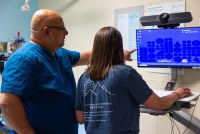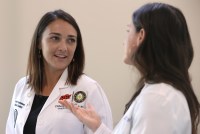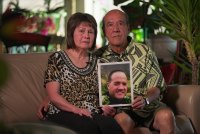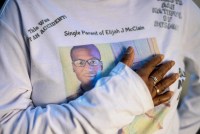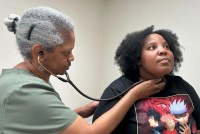Latest KFF Health News Stories
Biology, Anatomy, and Finance? More Med Students Want Business Degrees Too
A majority of medical schools now offer dual MD-MBA programs, compared with just a quarter two decades ago. The number of medical students seeking a business degree has nearly tripled. This begs the question: Whom will these doctors serve more, patients or shareholders?
Medicare Advantage Increasingly Popular With Seniors — But Not Hospitals and Doctors
Some hospitals and physician groups are rejecting Medicare Advantage plans over payment rates and coverage restrictions, causing turmoil for patients.
El altísimo costo de tener una enfermedad autoinmune en Estados Unidos
A pesar de ser muy frecuentes, encontrar ayuda para muchas enfermedades autoinmunes puede resultar frustrante y costoso.
Many Autoimmune Disease Patients Struggle With Diagnosis, Costs, Inattentive Care
Despite the prevalence of autoimmune conditions, like the thyroid disease Hashimoto’s, sometimes finding help can prove frustrating as well as expensive. There are often no definitive diagnostic tests, so patients may rack up big bills as they search for confirmation of their condition and for treatment options.
Compensation Is Key to Fixing Primary Care Shortage
Many proposals have been floated about how to address the nation’s primary care problem. They range from training slots to medical school debt forgiveness but often sidestep comprehensive payment reform.
Why It’s So Tough to Reduce Unnecessary Medical Care
Treatments that don’t help patients, and may even harm them, are difficult to eliminate because they can be big sources of revenue.
Who Will Care for Older Adults? We’ve Plenty of Know-How but Too Few Specialists
The principles and practices of geriatrics are being widely disseminated. And we understand much more now about how to improve older adults’ care. Yet we don’t have enough geriatricians to meet the growing demand.
The AMA May Reconsider Single-Payer Health Care
Is the American Medical Association going soft on single-payer health care? We’re about to find out. For more than a century, the most influential U.S. physician group has stridently opposed what could generally be described as “national health insurance.” It famously helped defeat health reform efforts in the 1930s and 1940s, delayed the establishment of […]
Medical School on Cherokee Reservation Will Soon Send Doctors to Tribal, Rural Areas
Native Americans and rural residents are underrepresented in medical schools. But in this new program, 25% of students are Indigenous and half are from rural areas.
Doctors Abandon a Diagnosis Used to Justify Police Custody Deaths. It Might Live On, Anyway.
The American College of Emergency Physicians agreed to withdraw its 2009 white paper on excited delirium, removing the only official medical pillar of support left for the theory that has played a key role in absolving police of culpability for in-custody deaths.
PrEP, a Key HIV Prevention Tool, Isn’t Reaching Black Women
New HIV infections occur disproportionately among Black women, but exclusionary marketing, fewer treatment options, and provider wariness have limited uptake of preexposure prophylaxis, or PrEP, drugs, which reduce the risk of contracting the virus.
Mothers of Color Can’t See if Providers Have a History of Mistreatment. Why Not?
Many women, especially Black women, have reported discrimination in maternity care, but expectant mothers lack tools to see where this happens. Funding and regulations to measure disparities have been slow in arriving, but some innovators are trying to fill the void.
Police Blame Some Deaths on ‘Excited Delirium.’ ER Docs Consider Pulling the Plug on the Term.
The American College of Emergency Physicians will vote in early October on whether to disavow its 2009 research paper on excited delirium, which has been cited as a cause of death and used as a legal defense by police officers in several high-profile cases.
With Its Two Doctors Planning to Retire, an Alabama Town Patches Together Health Care Options
LaFayette and other rural areas of the country tend to have high rates of health problems but not enough doctors. Many are adapting by investing in nontraditional prevention and treatment options.
As More Patients Email Doctors, Health Systems Start Charging Fees
Doctors say billing for email consultations reduces message volume and gives them more free time. The increasingly prevalent practice has also raised fears about negative impacts to patient care.
Pacientes reciben facturas por enviarles correos electrónicos a sus médicos
Con un fuerte aumento de los mensajes de correo electrónico durante la pandemia de covid, un número creciente de sistemas de salud han empezado a cobrar a los pacientes cuando los médicos y otros profesionales clínicos responden a sus mensajes.
The Shrinking Number of Primary Care Physicians Is Reaching a Tipping Point
The declining share of U.S. doctors in adult primary care is about 25% — a point beyond which many Americans won’t be able to find a family doctor at all.
California’s Medical Board Can’t Pay Its Bills, but Doctors Resist Proposed Fixes
Patient advocates have long alleged the Medical Board of California is ineffective at policing doctors. But a proposal to beef up its budget and overhaul procedures faces stiff resistance from the doctors’ lobby.
Médicos son reacios a preguntar el estatus migratorio de pacientes, a pesar de nueva ley de Florida
Médicos, enfermeras y expertos en política sanitaria afirman que la ley ataca a personas marginadas que ya tienen dificultades para navegar el sistema de salud y que les disuadirá aún más de buscar ayuda médica.
Doctors Hesitate to Ask About Patients’ Immigration Status Despite New Florida Law
Florida’s new immigration law requires hospitals to ask patients about their immigration status at admission and in emergency rooms, and report that information plus the cost of care for residents without legal status. Doctors and nurses who oppose the policy seem reluctant to criticize lawmakers for fear of political retribution.







